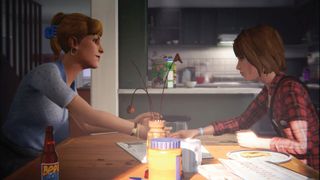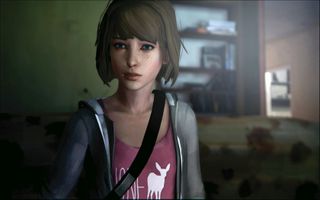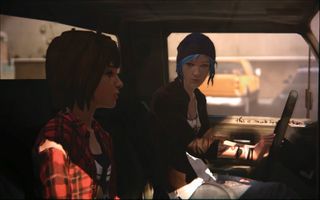Why I love the sense of regret in Life is Strange
Anatomising the melancholy of Dontnod's episodic drama.

In Why I Love, PC Gamer writers pick an aspect of PC gaming that they love and write about why it's brilliant. This week Tony analyses the way Life is Strange creates a powerful sense of loss.
After I finished I wanted to hear the soundtrack again, so I hit YouTube. There, among the comments demanding Max and Chloe should be together forever, or saying no game had even given them such feels before, AlchemicalGames had posted “It makes me sad in a really weird way. A little nostalgic, but also a sense of wanting my life to be more like it is for max.” Another commenter responded: “I thought I was the only one that felt this way.”
More replies followed. “Playing this game makes you feel like you’ve been missing something that you never realised until now.” “For me it’s Max’s friendship with Chloe. It’s a type of friendship I’ve never had in teendom.” “Something in life just feels missing, and this game has it.”
The last time I looked, that thread was over 40 responses long.
The sensation those Youtubers are experiencing is not actually that mysterious. The Germans, those masters of melancholy, even have a word for it: sehnsucht—a sort of painful nostalgia for something unknown in your life. What impresses me is that Life is Strange attempts to make people feel this way at all. Games tend to steer clear of the human condition. Even story-driven games rarely dare to make us feel sad as players: NPCs get sad, then usually we make them feel better by solving a quest. Life is Strange is that little bit more grown up in its approach. It’s an episodic detective adventure, and a high-school teen drama, but this is also very much a game about regret.

Pre-teen Max and Chloe were best friends forever. They shared a close, happy childhood. When modern-day Max explores Chloe’s house in Episode 1: Chrysalis, it’s a memory palace of reminders for her. Almost everything you click on reminds her of the good old days. An old chest of drawers: “we spent all day painting it blue.” A couch: “we used to pretend it was a pirate ship.” In the garden, a faded mural on hardboard shows two girls running off forever into a coloured-in world of adventure. “That took me and Chloe all day to draw.”
The memories are happy, but Max isn’t. Max moved away and didn’t keep in touch. Chloe’s dad died, and now she’s angry and bitter. Their carefree childhood world is gone forever. Max sits on the swing Chloe’s dad made for them, and remembers how Chloe was always there for her, while Julia Stone mournfully sings “You’re somewhere, I’m somewhere... You’re nowhere, I’m nowhere.”
That lost, crayon-coloured Eden is the backdrop to everything that follows. Not keeping in touch with Chloe was the one selfish act of Max’s life. (Seriously. She is officially the nicest person in videogames.) From here on, her determination to make it up to Chloe, to fix things somehow, is what drives the whole story to its devastating conclusion.
PC Gamer Newsletter
Sign up to get the best content of the week, and great gaming deals, as picked by the editors.
A gently wistful mood suffuses everything. Almost every character at some point tells Max they wish they could go back and change something in their past. The soundtrack consists almost entirely of acoustic, indie, downbeat songs about missing someone, saying goodbye or wishing things were different. Is it spring in beautiful Arcadia Bay? Or summer? No. It is autumn. The time of year when the world starts dying cinematically. ‘Arcadia’ itself is a word synonymous with lost paradise.

So, just as well Max has got a superpower to go back and fix the mistakes of the past, right?
Well, no, as it turns out. She can’t retrieve that lost childhood, Chloe and Max are teenagers now. She can’t prevent Chloe’s dad from dying, except at a hideous cost to Chloe. In the end she can only choose between sacrificing an entire town, or the one person she doesn’t want to let down ever again. Either way she’s looking at a lifetime of remorse.
If we feel nostalgia for the loss of Max’s little world, it’s simply because the devs have done such a brilliant job bringing it to life, whether we’re taking an illicit dip with Chloe in the school pool, sharing a final sleepover with her in the heartbreaking alternate timeline, or just watching the scenery glide past while a Josez Gonzales track plays. None of us ever really had such a deep relationship, or lived somewhere as scenic, but we’ve all known something like it, so Dontnod’s more intense version feels at once familiar and painful to lose.
We can’t hold on to the happy times any more than Max can, and this is the brilliant secret at the heart of Life is Strange: that what at first seems to be a superpower to fix regret is in fact only a way of experiencing it more intensely.
